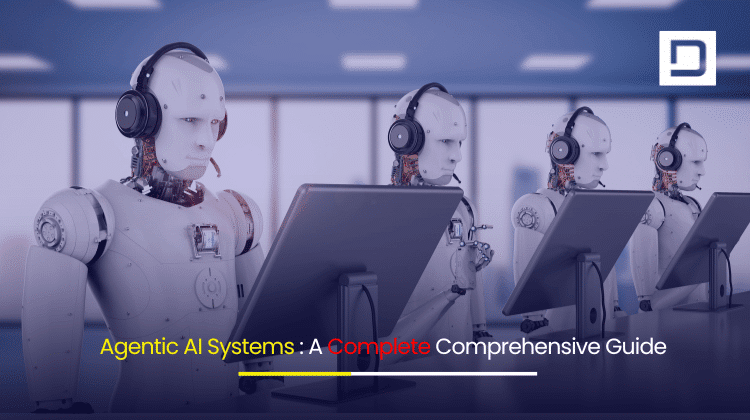Agentic AI System Development: A Complete Comprehensive Guide
In the ever-evolving landscape of Artificial Intelligence (AI), the emergence of Agentic AI Systems marks a significant paradigm shift. Unlike traditional AI models that operate on narrow instructions or tasks, agentic AI is designed to act autonomously, make decisions, and interact with the environment to achieve specific goals. At Depex Technologies, we believe understanding agentic AI is crucial for businesses, developers, and innovators aiming to harness the next wave of intelligent systems.
This blog offers a complete and comprehensive guide to Agentic AI Systems, their architecture, applications, benefits, challenges, and the future they promise.
What Are Agentic AI Systems?
Agentic AI refers to artificial intelligence systems capable of exhibiting goal-directed behavior with a level of autonomy. These systems can:
- Perceive their environment
- Make decisions
- Plan and execute tasks
- Learn from feedback
- Adapt based on experiences
Unlike rule-based or reactive AI, agentic AI functions more like intelligent agents with a purpose, context-awareness, and the ability to operate without continuous human supervision.
Core Components of Agentic AI Systems
- Perception Module:
- Uses sensors or data inputs to understand the surrounding environment.
- Processes data in real-time using computer vision, NLP, or signal analysis.
- Decision-Making Engine:
- Evaluates options and selects optimal paths to reach desired outcomes.
- Employs algorithms like reinforcement learning or symbolic reasoning.
- Planning and Execution:
- Breaks down goals into subtasks and timelines.
- Allocates resources and dynamically adjusts plans.
- Memory and Learning:
- Retains past experiences for continuous learning.
- Updates strategies based on feedback and new data.
- Communication Interface:
- Interacts with users, other agents, or systems.
- Enables collaboration, queries, or reporting.
How Agentic AI Systems Differ from Traditional AI
| Feature | Traditional AI | Agentic AI |
|---|---|---|
| Autonomy | Limited | High |
| Learning | Often Static | Continual |
| Goal Orientation | Task-Specific | Mission-Oriented |
| Adaptability | Reactive | Proactive |
| Environment Interaction | Minimal | Dynamic and Contextual |
Agentic AI pushes the boundaries by integrating cognition, autonomy, and multi-agent coordination.
Applications of Agentic AI Systems
- Healthcare:
- Autonomous diagnostic agents
- Personalized treatment planning
- AI-driven robotic surgery
- Finance:
- Intelligent trading bots
- Fraud detection agents
- Risk analysis systems
- Manufacturing:
- Smart production line managers
- Predictive maintenance agents
- Supply chain optimization
- Customer Service:
- AI support agents with decision-making capabilities
- Virtual assistants that escalate or reroute based on context
- Smart Homes and Cities:
- AI agents for energy management
- Traffic and transport optimization
- Surveillance and security agents
- E-Commerce:
- Intelligent shopping assistants
- Dynamic pricing and inventory management
- Personalized recommendation engines
Benefits of Agentic AI Systems
- Efficiency: Minimizes human intervention in repetitive or complex tasks.
- Scalability: Can handle massive operations with decentralized intelligence.
- Personalization: Learns user behavior and tailors responses or services.
- 24/7 Operation: Agents work continuously without fatigue.
- Resilience: Can adapt to new scenarios or environments seamlessly.
Challenges and Ethical Considerations
- Security Risks:
- Autonomous systems can be targets of cyber threats.
- Need robust safeguards to prevent misuse or errors.
- Ethical Dilemmas:
- Decision-making by AI in sensitive contexts (e.g., healthcare, justice) raises moral concerns.
- Transparency:
- Explainability of AI decisions remains a challenge.
- Black-box systems can be hard to audit.
- Bias and Fairness:
- Agents trained on biased data can perpetuate discrimination.
- Regulation:
- Lack of global standards for agentic AI usage.
- Dependence:
- Over-reliance on agentic AI may reduce human oversight and skills.
Building Agentic AI Systems: A Step-by-Step Guide
- Define Clear Objectives:
- What should the agent accomplish?
- Set measurable KPIs and constraints.
- Select the Right Tools & Platforms:
- AI frameworks: TensorFlow, PyTorch, Rasa, LangChain
- Language models: GPT-4, Claude, Gemini
- Design the Agent Architecture:
- Modular design for perception, planning, and execution
- Train the System:
- Use supervised, unsupervised, or reinforcement learning.
- Incorporate feedback loops.
- Test in Simulated Environments:
- Validate agent behavior in controlled scenarios before deployment.
- Deploy & Monitor:
- Use observability tools to track decision-making and performance.
- Iterate & Improve:
- Continuously update models based on real-world feedback.
Agentic AI in the Context of Multi-Agent Systems
Multi-agent systems (MAS) are where multiple agentic AIs work together to solve complex problems. Examples include:
- Swarm robotics
- Collaborative logistics
- Distributed sensor networks
MAS can distribute tasks, share knowledge, and optimize performance collectively.
The Future of Agentic AI
Agentic AI is set to revolutionize how machines understand and act within the world. Future advancements may include:
- Human-AI Symbiosis: AI as co-pilots for human decisions
- Emotionally Intelligent Agents: Understanding and reacting to human emotions
- Self-Improving Agents: Systems that rewrite their code for better performance
- Global Agent Networks: AI agents collaborating across borders and industries
Why Depex Technologies is Your Partner for Agentic AI Solutions
At Depex Technologies, we specialize in building intelligent, adaptive, and secure AI systems tailored to your business needs. Our expertise spans:

- AI strategy and consulting
- Custom agentic system development
- Integration with IoT, cloud, and enterprise systems
- Ongoing monitoring and performance tuning
Whether you’re looking to automate complex workflows, build a smart assistant, or create a multi-agent infrastructure, Depex Technologies is your trusted technology partner.
Conclusion
Agentic AI Systems are more than a technological trend—they are a glimpse into the future of autonomous, intelligent problem-solving. Their ability to think, learn, and act makes them invaluable across industries. Businesses that embrace this shift will be better positioned to lead in innovation, efficiency, and customer satisfaction.
At Depex Technologies, we are prepared to guide you into the next era of innovation. Get in touch to discover how agentic AI can elevate your business operations.






